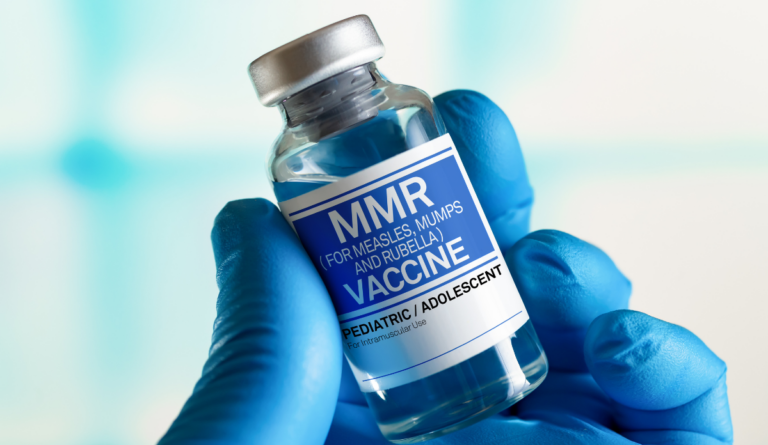Blotchy Excuses: MMR Vaccine Exemptions
After the state of Washington eliminated personal belief exemptions for the MMR vaccine series in 2019, the rate of students with a religious exemption for any required vaccine increased.

Read Time: 4 minutes
Published:
In January 2019, Washington state health officials declared a state of emergency as they scrambled to contain dozens of cases of measles. The outbreak had produced the highest number of measles cases Washington had seen since the 1990s.
Washington, like all U.S. states, has vaccination requirements for school enrollment, including the vaccine for measles, mumps, and rubella (MMR). Until 2019, parents in Washington could waive immunization requirements by claiming one of two types of non-medical exemption: religious or personal beliefs. Parents could send their unvaccinated children to school after filling out a two-page form signed by a health care professional, which could be easily obtained from sympathetic doctors and nurses.
After enduring a second outbreak in June of the same year, Washington eliminated personal belief exemptions for the MMR vaccine series. This change meant that, other than for medical reasons, only religious exemptions were allowed, with the aim of making it more difficult for parents to opt out of vaccinating their children.
Measles, a severe and highly contagious disease mostly affecting children, was once an enormous threat to public health, infecting an average of 542,000 Americans per year from 1956 to 1960. Thanks to the widespread uptake of the childhood MMR vaccine, the disease largely faded from public consciousness by the mid-1990s. But leading up to the outbreaks in Washington and other parts of the country, a movement of vaccine refusal had gained momentum among parents in the 2000s and 2010s. By 2019, vaccine rates for children in Washington had dropped from 96% in the 1980s to under 90% (significantly below the herd immunity threshold of 95% for measles).
Using the Washington Annual School Immunization Report, Tyler Moore and colleagues examined changes in the number of vaccine exemptions for K-12 students and the number of kindergarteners in Washington receiving the two-shot MMR vaccine series between 2014 and 2022.
Researchers compared their state vaccine data to that of Oregon, a culturally similar, neighboring state whose immunization laws did not change during the study period.
Despite not being able to claim personal belief exemptions, Washington continues to make it easy for motivated parents to exempt their kids from required vaccines by allowing for more religious exemptions.
After personal belief vaccine exemptions were prohibited, kindergarten MMR vaccine completion rates increased in Washington by 5.4%, going from 89% to approximately 94% in 2020. However, completion rates dropped again to 92.6% in 2022. No similar increases were seen in Oregon during this time, suggesting that the change in exemption rules likely spurred this change.
While the number of personal belief exemptions in Washington dropped from 3.7% to 2.0%, the rate of students with a religious exemption for any required vaccine increased by 367%, from 0.3% to 1.4% of students. The increase indicates that many parents who would have used personal belief exemptions instead used a religious exemption to avoid vaccinating their children, even though Washington ranks toward the bottom of all U.S. states in terms of religiosity.
Seven states (Mississippi, California, New York, Maine, West Virginia, Connecticut, and Rhode Island) have eliminated both personal belief exemptions and religious exemptions for K-12 student vaccine requirements. By only allowing medical exemptions, these states have achieved some of the country’s highest rates of childhood vaccinations. Despite not being able to claim personal belief exemptions, Washington continues to make it easy for motivated parents to exempt their kids from required vaccines by allowing for more religious exemptions.
While eliminating religious exemptions would offer a more effective means to eliminate measles cases, the authors suggest that allowing some religious exemptions might be more politically realistic. States with more restrictive criteria tend to have lower rates of non-medical exemptions and, therefore, higher vaccination rates. Policies to increase vaccination might include introducing requirements for parental education or mandating that parents reapply annually for exemptions.
Photo via Getty Images



